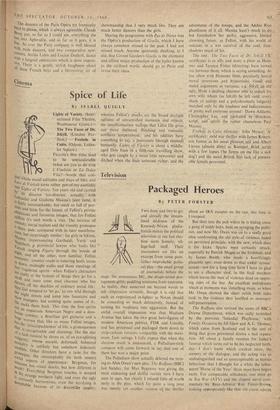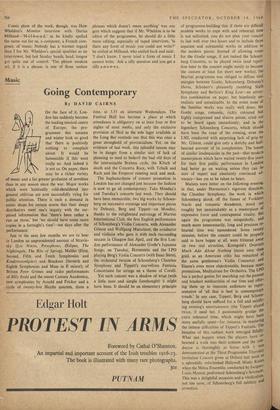Television
Packaged Heroes
By PETER FORSTER rwo dons and two to go; and already the stream- lined slickness of the Kennedy-Nixon iOrials'makes the political . television at our Iasi elec- tion seem homely, vil- lage-hall stuff. Their encounters are likc an excerpt from some poor, rather improbable politi- cal play—the small group of journalists before the stage. the sententious MC, the drape-suited pro- tagonists glibly peddling nostrums from rostrums. As reality, they unnerved me beyond words to tell—impressive certainly, though it is odd that such an experienced in-fighter as Nixon should he conceding so much defensively, instead of turning his weakness into aggression. But the awful overall impression was that Madison Avenue has taken the two great hero-figures of modern American politics, FDR and Lincoln, and has processed and packaged them down to strip-cartoon versions compatible with the maxi- mum Tarn ratings. I fully expect that when the election result is announced, a Palladium-style compere will come forward to say that one of them has won a major prize.
The Palladium show actually delayed me turn- ing to Alun Owen's new play. The Ruffians (BBC) last Sunday. for Max Bygraves was giving the most endearing and skilful variety turn I have seen in ages, but clearly I missed little of. worth early in the play, which for quite a long time was merely yet another version oC the thriller about an IRA escapee on the run, this time in Liverpool. . . But then into the pub where he is hiding come a gang of teddy-boys, bent on savagingthe publi- can, and now Mr. Owen was on to a really good idea, confronting the old style .of violence, based on perVerted principle, with the new, which does it for kicks. Sparks were certainly struck, especially by Patrick Magee as the irishrnan, and by James Booth, who made a horrifyingly plausible spiv, even down to that awful 'scousc' accent--not for a long time have I been so glad to see a character shot, in the final mayhem which leaves the men of violence dead on oppos- ing sides of the bar. An excellent melodrama which at moments was 'iomething more, as when Mr. Owen showed the. . sheer relish both sides took in the violence they justified as necessary self-preservation.
The Ruffians also revived the name of BBC's Drama Department, which was sadly tarnished by the previous `Saturday Playhouse,' with Family Occasion by Jill Glew and A. C. Thomas, Which came from Scotland and is the sort of thing that gives provincial draina a bad reputa- tion. All about a family reunion for father's funeral which turns out to be his neglected birth- day--I don't know which creaked more, the scenery or the dialogue, and the acting was so undistinguished and so unrecognisable as human . behaviour that I thought for a while the subse- quent 'Horse of the Year Show must have begun early. For comparable stiltedness, one must go to Sea War (ATV) and the clipped naval com- mentary by Rear-Admiral Roy Foster-Brown, looking appropriately like that old cocoa advert. Comic plum of the week, though, was Huw Wheldon's Monitor interview with Darius Milhaud—`M-i-l-h-a-u-d,' as he kindly spelled the name out for us, a composer, a French com- poser, of music. Nobody has a warmer regard than I for Mr. Wheldon's special qualities as an interviewer, but last Sunday hands, head, tongue got quite out of control. `The phrase modern art, if it is a phrase, is one of those useless phrases which doesn't mean anything' was one gem which suggests that if Mr. Wheldon is to be editor of the programme, he should do a little more editing, especially of taped interviews. 'Is there any form of music you could not write?' he smiled at Milhaud, who smiled back and said: 'I don't know, I never tried a form of music I cannot write. Ask a silly question and you get a silly a-n-s-w-e-r.







































 Previous page
Previous page